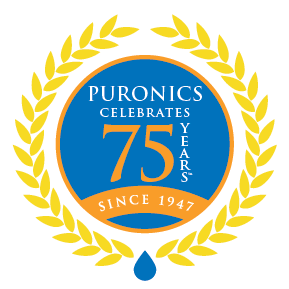Last Updated on August 26, 2021
A whole-house water softener is a fantastic way to keep buildup off faucets, use less detergent and even address certain skin problems. That said, they do require upkeep. The most frequent form of maintenance your system will require is a refill on water softener salt. A quick Google search will show dozens of brands offering salt in pellets, crystals, blocks and even alternate elements like potassium chloride instead of sodium chloride. Where to begin?
Why Do Softeners Need Salt?
Let’s start with a brief rundown of why your water softener needs salt in the first place. Hard water contains “hardness minerals” — chiefly magnesium and calcium ions — that can cause buildup and other issues. A water softener loads beds of resin beads with sodium ions, and as the hard water flows through the softener media the hardness minerals are replaced by ions from salt.
After softening a certain number of gallons, the resin beads will be at capacity for taking on more hardness minerals. Your water softener salt will backflush the beds, clearing them of magnesium and calcium ions, and exchanging for fresh sodium (or potassium) ions from the backflush tank.
Salt is the key to continuing the softening process day after day. You’ll need to keep refilling your backflush tank with salt (every month to month-and-a-half for the average home) to keep your water soft.
Salt Form Factors
In order to narrow your water softener salt search, you’ll need to decide what form you want your salt in. Salt can come in pellets, crystals or solid blocks, and which kind you choose makes a difference. Some types are purer than others — when water softener salt is impure it can leave behind a non-soluble residue in your backflush tank, which can cause bridging and blockages that have to be removed by hand. On the other hand, more pure salt forms tend to be more expensive. We’ll list them here in rough order of most-to-least pure.
Evaporated Pellets
Evaporated pellets are typically the purest form of salt you can find. They come in up to 99.9% purity, which ensures almost no buildup or bridging on the inside of your softener. Pellets can also be the most expensive form of water softener salt, due to the extra processing required to purify them through evaporation. If you have particularly high water usage, pellets may be worth the price to avoid the inevitable buildup from other water softener salts.
Solar Crystal
Solar water softener salt is fairly pure, ranging up to 99.6% salt. It’s also less pricy than evaporated pellets, making it a great mid-range option for the average home. Note that solar salt can be made into pellets but will still have the 99.6% purity — while that doesn’t seem like a big difference from 99.9%, it will still cause buildup and potential clogs over a long period of use.
Rock
Rock salt, the least pure (and least expensive) of the options here, is salt mined from natural deposits. Called halite, it contains high amounts of non-soluble calcium sulfate. These and other impurities can cause buildup, bridging and blocking in your water softener system. As such, we do not recommend using rock water softener salt in an all-in-one system. These systems are more difficult to maintain and should use more pure pellets or crystals. Rock salt can be used in two-part systems, ideally in a home with low water use. In this situation, rock water softener salt can be an adequate and more economical substitute for pellets or crystals.
Block
Block salt is what it sounds like: a solid block of salt. While it can be made to any purity, you should not use block salt without consulting your water softener provider or technician. They’ll need to raise the water levels in your backflush tank, and not all systems will accommodate block salt.
Those are the major form factors for water softener salt. Once you know what form factor fits your needs best, you’re most of the way there.
Specialty Salts and Salt Additives
Just when you feel you’re ready to purchase your water softener salt, you’ll run into specialty options for your water softener system. Here are some common types and their benefits:
“Resin Cleaning”: Rust and Iron Removal
One trick your average water softener salt won’t pull off is removing iron ions from the resin beads in your softener. The backflushing process will remove the hardness minerals and recharge with sodium ions, but trace iron can slowly build up and lessen the effectiveness of your softener. Special salts contain additives that will flush the iron from your resin layer, lengthening the effective life of your softener.
These salts aren’t necessary for consistent use, but it may be a good idea to run a batch through your softener once a year. In areas where water has high iron content it may be needed more frequently.
Appliance and System Protection
These salts claim to reduce existing buildup in your softener and in appliances throughout your home. The effectiveness may vary by brand, but like iron-fighting salts can be used as needed.
For the most part, you’ll be fine using regular old sodium chloride, though other salts can be helpful in specific geographic areas or periodically as required. Consult with your local Authorized Dealer to learn about your area and system needs.
Potassium Chloride
This special variety of water softener salt deserves a section all its own. Some will term potassium chloride as “salt free”, but in reality, potassium chloride is simply another type of salt. (Being a salt has more to do with the chloride and atomic structure than whether it contains sodium or not.)
Using a sodium chloride salt in your water softener replaces hardness minerals with sodium ions. Using a potassium chloride salt simply does the same thing with potassium. Your water softener will result in you drinking trace, unnoticeable amounts of these perfectly natural and normal substances.
Certain people have such serious sodium intake restrictions that using traditional sodium chloride in their softener can put extra pressure on their diet. On the other hand, it’s no secret that excess potassium is much safer and healthier than excess sodium (amounts much higher than your water softener will ever contribute). However, potassium chloride can be five times the price of sodium chloride water softener salt, and it requires refilling more frequently. This can add huge expense for benefits most people won’t need. Make sure you know your reasons for needing potassium chloride before deciding to use this sodium alternative.
Which Salt is Best for Water Softeners?
We’ve gone through the form factors of salt, discussing the balance of purity and price. We’ve mentioned specialty salts and reviewed the realities behind potassium chloride.
When it comes down to it, pick the salt that meets your needs, both for your water and your wallet. If you have specific concerns or questions, you can always consult your local Authorized Dealer.
General Water Softener Salt Questions
How long does salt last in a water softener?
An average softener with average water use will require salt every 6-8 weeks. It’s a good idea to check your backflush tank every month to see how your usage may be changing.
How much does water softener salt cost?
Water softener salt prices vary widely. You can find bags as cheap as 12 cents per pound for rock or solar salt, or evaporated salt pellets for upwards of 25 cents per pound. 40 lbs is a common bag size, making prices range from $4.50 to $10.00 per bag. Morton water softener salts are a great benchmark for a quality salt at a reasonable price, averaging around $6.50 for a 40 lb bag.
Potassium chloride comes at a much higher price, approaching a dollar per pound in some cases. Consider your needs carefully — while 30 dollars a month may not seem expensive for sodium-free softening, that cost will add up as the years go by.
Another price consideration is purchasing your salt online. This is one of the few items that will nearly always be cheaper to pick up in person. Why? While it’s inexpensive to produce, it’s heavy and difficult to ship. You’ll almost always save money by picking up your salt in person.
Regularly Asked Maintenance Questions:
Should there be water in my salt tank?
It depends on if it’s a pre-brine or post-brine system. Most Puronics systems are pre-brine. If it’s pre-brine, there will be little to no water. If it’s a post-brine system, it will have some water in the backflush tank.
Why is my softener not using salt?
First, make sure your softener is truly not using salt. It doesn’t use much per day, but if after 30-45 days you don’t see a change in salt level, you probably have an issue. The most common reason a softener won’t use salt is because of buildup on the inside of your backflush tank, called a bridge. This can be removed easily by hand if visible, but you may need to call a technician if it’s on the inside of your softener system.
How do I know if my water softener is working properly?
If you have extremely hard water before purchasing a softener, you’ll likely notice if your system stops working. Soap will lather differently in the shower, clothes will dry stiffer and buildup or water spots will quickly become noticeable. If these signs aren’t appearing, but you are unsure your system is working properly, you can order a water hardness test kit from many sources and check your water yourself.
How do I know when my water softener should be replaced?
The typical water softener lasts between 10 and 15 years. If your softener is approaching this age range, and you start noticing the signs of hard water, order a test kit and test your water. If your water is registering as hard even though your system is using up water softener salt and performing as expected, call your local Authorized Dealer and have them diagnose any problems. They’ll let you know if your softener’s time is up.
We hope you feel prepared to make an educated decision on the best salt for your water softener. For softener systems or specific salt questions, feel free to contact us or your local Authorized Dealer.
© 2020 Puronics All Rights Reserved

 Puronics, Incorporated
Puronics, Incorporated



